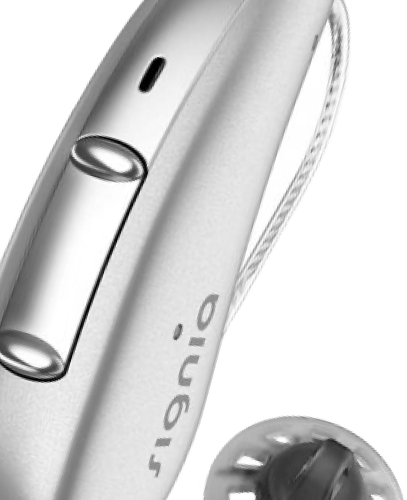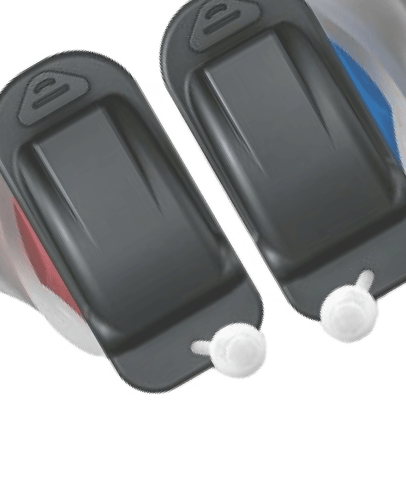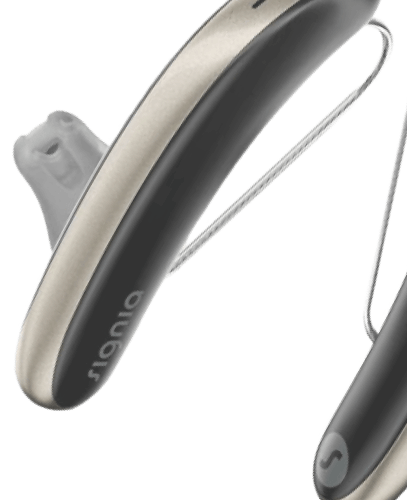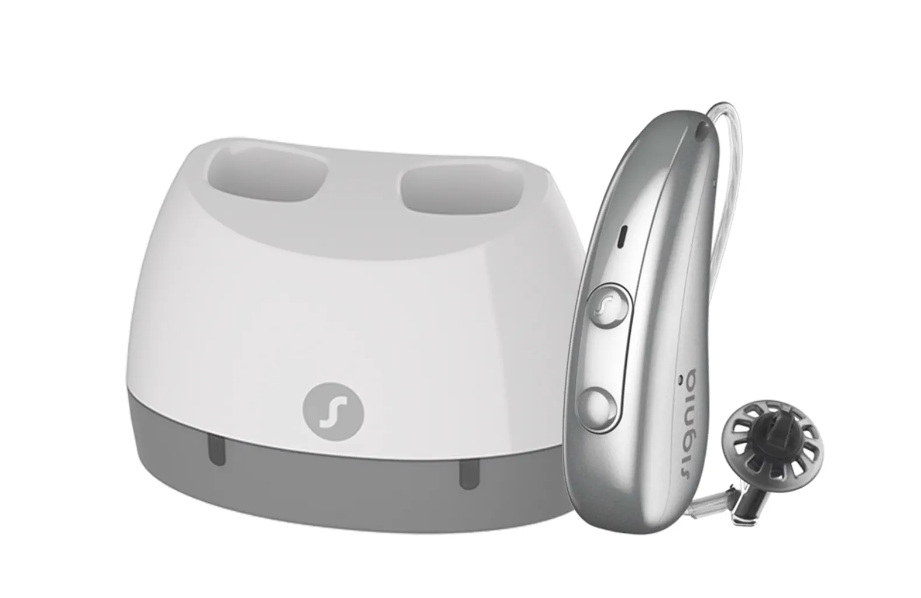Types of Hearing Aids: Factors to Consider, Tips & FAQs

Waking up to the chirping of birds outside your window and the cheerful laughter of your loved ones chatting in the garden is a true bliss most of us take for granted.
But what if these everyday sounds are not as clear as they used to be? Hearing challenges can manifest in various ways, from struggling to follow conversations in noisy environments to missing important sounds in everyday life.
The solution? Hearing aids.
We will explain the diverse types of hearing aids and offer expert advice to help you choose the right one for you.
Looking for high-quality hearing aids?
Types of Hearing Aids
When choosing hearing aids make sure to pick the one that suits your hearing condition, preferences, and any additional features you might need. Consider consulting with a qualified audiologist to ensure the hearing aid you picked aligns perfectly with your needs and lifestyle.
1. Behind-the-Ear (BTE) Hearing Aids
BTE hearing aids are designed to be worn at the back of the ear. They are connected to a custom earpiece or earmold with a thin wire or tubing.
BTE hearing aids have bigger batteries which ensure a longer battery life. They often come with additional features, such as wireless connectivity and directional microphones.
Behind-the-ear hearing aids are versatile and can be used by people of all ages, including children. They can be a great option for users with mild to profound hearing loss who prefer a durable, easy-to-handle hearing aid.
2. In-the Ear (ITE) Hearing Aids
ITE hearing aids are custom-made to fit within the outer portion of the ear canal. They come in different sizes and can include a full shell (occupying the entire bowl of the ear) and half shell (filling only the lower portion of the bowl).
ITE hearing aids are appealing and discreet. Depending on the size and style, they may include features such as volume control and directional microphones.
In-the-ear hearing aids are ideal for people with mild to severe hearing loss who want a more discreet yet functional hearing device.
3. In-the-Canal (ITC) Hearing Aids
ITC hearing aids fit partially into the ear canal — this makes them less visible than ITE models. They are custom-made to match the shape of your ear canal.
ITC hearing aids offer a combination of discretion and functionality, often featuring telecoil technology and feedback suppression.
They are great for users with mild to moderate hearing loss who prefer a discreet and comfortable option that provides natural sound quality.
4. Completely in-the-Canal (CIC) Hearing Aids
CIC hearing aids fit entirely inside the ear canal and are virtually invisible when worn.
They offer maximum discretion and natural sound quality with some models featuring wireless connectivity and tinnitus masking.
Completely-in-the-canal hearing aids are ideal for individuals with mild to moderate hearing loss who value discretion and are comfortable with small devices.
5. Invisible-in-the-Canal (IIC) Hearing Aids
IIC hearing aids sit deep inside the ear canal and are completely invisible when worn — they are the most discreet hearing aid model on the market.
Despite their small size, IIC hearing aids may include advanced features like wireless connectivity and noise reduction.
Invisible-in-the-canal hearing aids are recommended to users with mild to moderate hearing loss who want their hearing aid to stay out of sight.

Factors to Consider When Choosing a Hearing Aid
As you are exploring the possibility of getting hearing aids, you might prioritize discretion and appearance, however, when choosing hearing aids, there are many other factors to consider that can make a great difference in how well you hear.
1. Degree of Hearing Loss
The severity of your hearing loss plays a crucial role when choosing the type and features of the hearing aid you need.
For example, if you suffer from profound hearing loss, you may need more powerful hearing aids with higher amplification levels.
2. Lifestyle and Activities
Your lifestyle and daily activities are important considerations because they determine where and how you’ll use your hearing aid.
If you lead an active lifestyle or frequently participate in outdoor activities, look for a hearing aid with features like wind noise reduction and water resistance.
If you engage in social gatherings or meetings, you may prefer a stylish and modern hearing aid option that enhances communication in noisy environments.
3. Appearance and Aesthetics
The look of your hearing aid matters because it may affect your confidence, comfort and willingness to use the device.
While some users may prefer discreet designs, others may prioritize functionality over aesthetics.
In addition, you might prefer specific colors and designs to ensure that they fit your personal style.
4. Budget Considerations
Hearing aids vary in price depending on factors like brand, features and technology.
It is important to establish your budget and consider the long-term costs for maintenance, repairs and battery replacements.
You’ll find both affordable options with good amplification and functionality and high-end models with cutting-edge features at a higher price.

Our Tips for Choosing the Right Hearing Aid for Your Needs
To help you choose the right hearing aids for your condition, preferences and lifestyle, our professionals at Ascend Hearing have compiled several valuable tips.
- Take an online hearing test: Online hearing tests, such as the one provided by Ascend Hearing, can help you assess your hearing from the comfort of your home. They consist of a series of audio prompts to evaluate your ability to hear different frequencies and speech sounds. While online hearing tests may not replace a professional evaluation, they can provide valuable insights into your hearing health.
- Get a comprehensive hearing evaluation: Visit a qualified audiologist who will determine the type and degree of your hearing loss.
- Consider your lifestyle and daily activities: Consider the places you often go to or spend time in — this will help you identify the features you might need in a hearing aid.
- Research different types of hearing aids: Familiarize yourself with the various types of hearing aids. Focus on their design, features and suitability for your needs.
- Consult with a hearing healthcare professional: Seek guidance from an expert — they can provide advice, recommend the best hearing options for your condition and assist with the fitting and adjustment process to ensure optimal performance and comfort.
- Consider your cosmetic preferences: Think about the appearance and visibility of the hearing aid. Determine whether you prioritize discreetness or are comfortable with more visible designs.
- Evaluate connectivity options: Assess whether you need wireless connectivity features, such as Bluetooth compatibility, to stream audio from smartphones, TVs or other devices directly to your hearing aids.
- Assess comfort and fit: Make sure that the hearing aid you choose is comfortable to wear and properly fits your ears.
- Review battery life and maintenance requirements: Compare the battery life of different models along with maintenance requirements, battery type and lifespan.
- Ask about trial periods and warranties: Check if the manufacturer or provider offers trial periods and warranties for their hearing aids. This option will allow you to test the devices and ensure satisfaction before making a final commitment.
Enhance Your Life with Ascend Hearing
Ascend Hearing provides access to premium hearing devices coupled with expert care and guidance.
Our vision is to empower people to take control of their hearing loss and reclaim their quality of life. We believe that hearing well is crucial for a fulfilling life full of rich experiences and treasured moments with your loved ones.
If you lead an active lifestyle and need a hearing aid that blends in with your daily routine, our behind-the-ear models are durable and reliable, allowing you to stay connected with the world around you.
For discreet hearing support, our completely-in-the-canal hearing aids provide an invisible solution perfect for professional settings or social gatherings.
If you’re fashion-conscious and are looking for sleek and sophisticated accessories, our range of modern designs and color options will help you express your personality while enjoying improved hearing.
Reverse your hearing loss and improve your quality of life with Ascend Hearing.
Need hearing aids?
Types of Hearing Aids: FAQs
Curious about common questions regarding hearing aid options? Explore our FAQ section below for answers on various types of hearing aids.
1. Can I use hearing aids if I engage in water activities?
Yes, there are water-resistant and waterproof hearing aid options. Look for models with Ingress Protection (IP) ratings that indicate their resistance to water and moisture.
2. Can I listen to music with hearing aids?
Yes, many modern hearing aids offer music settings specifically designed to enhance your music listening experience. Look for models with additional features, such as extended frequency response and music processing algorithms.
3. Are there hearing aids that can help manage tinnitus?
Yes, some hearing aids offer built-in tinnitus masking features. These can include sound therapy programs that provide soothing sounds or white noise and help alleviate the perception of tinnitus.
4. Can I connect my hearing aids to my smartphone?
Yes, most hearing aid devices offer wireless connectivity options. This allows you to stream phone calls, music and other audio directly to your hearing aids via Bluetooth or other wireless protocols.
Buy premium hearing aids




